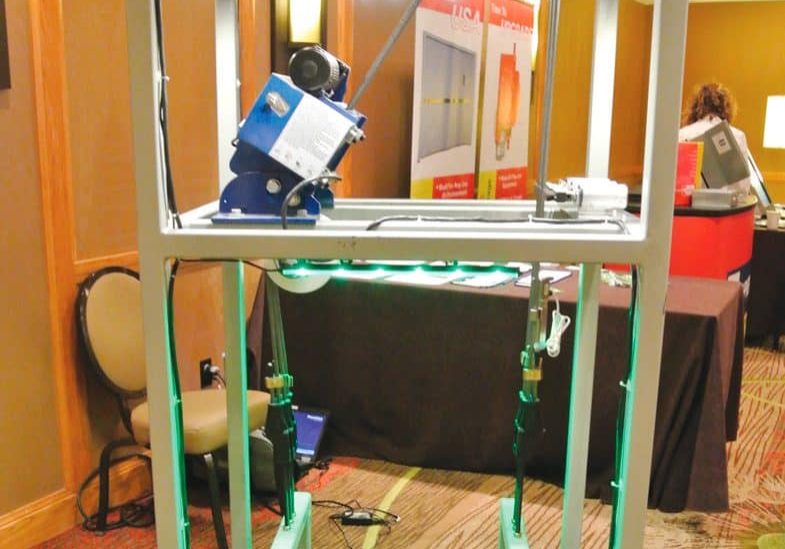Penn State Elevators Go Up; Environmental Risks Go Down
Jul 1, 2014

Soy-based hydraulic fluid reduces contamination, costs.
Pennsylvania State University (Penn State) built a winning team for sustainability. Together with soybean farmers and the U.S. Department of Agriculture, the school combined the strengths of staff, facilities, environmental management and research. The result was a bio-based product that is a sustainability solution for buildings across the country.
For every floor a hydraulic elevator services, it typically has a shaft running an equal distance down into the ground. These hydraulic-fluid-powered elevators have a range of two to six stories, so their cylinders may penetrate six stories underground. Not often, but occasionally, these cylinders spring a leak. Hydraulic fluid can then contaminate soil and groundwater. The deeper the contamination, the more difficult and expensive it is to clean up.
“Soy-based hydraulic fluid dramatically reduces our exposure to remediation costs if we should ever have a leak or spill in one of our more than 100 hydraulic elevators here at Penn State,” explained Mark Gates, elevator supervisor. “Fortunately, we have not had any major spills since we began switching to this fluid.”
“In total, we are using more than 17,000 gal. of the soy-based hydraulic fluid at Penn State’s University Park here in State College,” Gates continued. “There are 21 other campuses of Penn State that I don’t supervise. They also have hydraulic elevators using the soy bio-based fluid, so our total volume is even larger than that.”
Penn State Environmental Compliance Engineer Lysa Holland added:
“It’s biodegradable, so, while we know we must clean up any spill, the procedures approved by the Pennsylvania Department of Environmental Protection (DEP), the agency [that] oversees spill cleanups, [does] not require expensive groundwater remediation.”
Holland recounted the fluid’s history:
“It all began in 1998, when the manager of our College of Agriculture farms came to me and asked for help. ‘Surely there is something we can do. Every time I break a hydraulic hose on one of my tractors, it’s bad for the environment and expensive for Penn State,’ he said.
“I went to work on the problem, and I discovered we had one of the leading experts on bio-based fuels and oils right here: Chemical Engineering professor Joseph Perez. We solved that farm manager’s problem with a soy-based hydraulic fluid.”
With that success, Holland and Ed Jaskowak, who is now retired but was then working with Penn State’s hydraulic elevators, began discussing the possibility of a similar soy bio-based fluid for the elevators. Perez and some of his graduate and post-doctorate-degree students had been working on hydraulic- and elevator-fluid concepts since 1995. In 2002, the U.S. Department of Agriculture’s Agricultural Research Service in Peoria, Illinois, had successfully tested the product in the Statue of Liberty elevator. Bunge North America purchased the licensing agreement in 2005, making it commercially available under the brand name AgriTech® soy-based hydraulic fluid (ELEVATOR WORLD, December 2006).
“Soy-based hydraulic fluid dramatically reduces our exposure to remediation costs if we should ever have a leak or spill in one of our more than 100 hydraulic elevators here at Penn State.” – Mark Gates, elevator supervisor
Holland’s next step was to discuss the soy-based hydraulic fluid with the state’s DEP. After testing the fluid, the DEP agreed it was less toxic and biodegradable, and would need less remediation in the case of a future spill. By 2009, all Penn State hydraulic elevators had been switched to AgriTech fluid, and those installed since 2009 also use the fluid.
“Perfect Case History” for Sustainability Partnerships
Steven Maruszewski, the assistant vice president, physical plant, and lead official for championing sustainability programs throughout the university, said:
“This is a perfect case history of how all concerned parties — those responsible for operations, those responsible for compliance and those who have the scientific knowledge and skill — at a university like Penn State can work together, to advance sustainability goals.”
Maruszewski added that Penn State has presented the case history at sustainability meetings for all Big 10 Conference universities and at other programs, like Elevator U.
Dr. Perez pointed out that the Pennsylvania Soybean Board and soybean farmers across the nation also played a role in the early development of soy-based hydraulic fluids. State checkoff programs and the United Soybean Board (USB) have helped fund research. “The Pennsylvania Board provided some funds for the first study on soy-based hydraulic fluid for the Penn State tractors, and the USB has [provided] funds for study in handling the used fluid,” he explained.
Win/Win
Holland said:
“This is really a win/win situation. It’s a case where everyone — our scientists, our maintenance staff, our administration — all came together with the soybean farmers and industry to solve a problem. I can and do recommend this system and soy bio-based hydraulic fluid to other universities and institutions. . . . Really, to anyone responsible for maintaining a hydraulic elevator.”
Get more of Elevator World. Sign up for our free e-newsletter.









